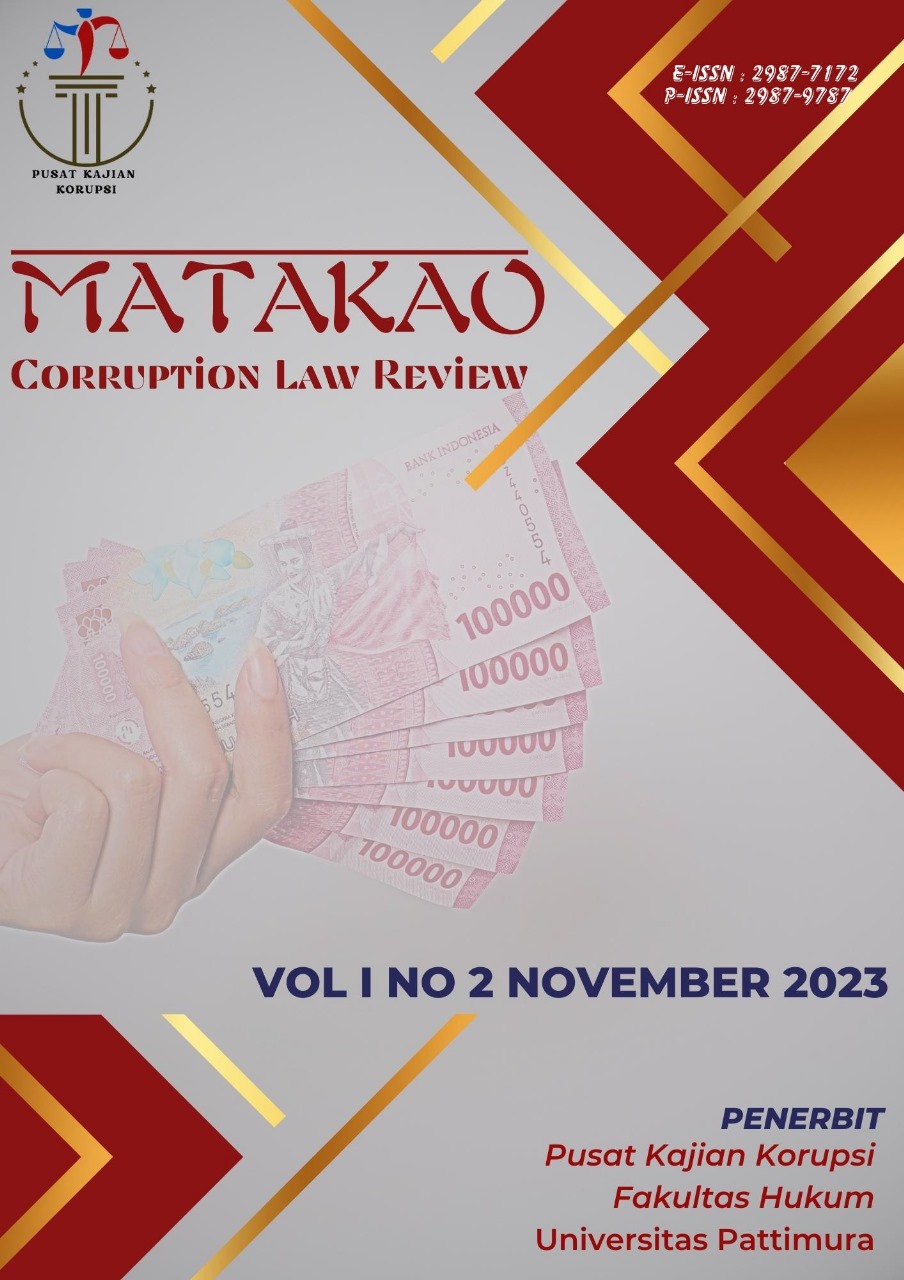Perlindungan Hukum Terhadap Justice Collaborator di Indonesia (Analisa Putusan Nomor : 48/Pid.Sus/TPK/2016/PN.Jkt Pst)
Abstract
Introduction: Corruption harms the country's finances and the socio-economy of society. Corruption tends to be committed by more than one person. Corruption crimes that have been caught by the Corruption Eradication Commission (KPK) have obstacles to revealing and detaining parties who have committed corruption crimes due to a lack of information or data. Then came the idea of the Justice Collaborator (JC), which was first known in America in the 1970s, namely cooperation to reveal the main mastermind of the corruption crime with the convict of corruption. The key role of a justice collaborator is to uncover a crime or the occurrence of a crime, so that the return of assets from the results of a crime can be achieved to the state.
Purposes of the Research: Analyzing the urgency of Justice Collaborator corruption in Indonesia.
Methods of the Research: The research method used is juridical-normative research. Data sources include primary data and secondary data. Data collection techniques through the study of documentation and data analysis used Qualitative Analysis. The problem approaches used in this research are statute, conceptual, and case approaches.
Results of the Research: The results research the urgency or existence of a Justice Collaborator at the stage of Investigation in corruption in Indonesia is essentially to assist law enforcement officers in finding and finding facts related to crimes including corruption, which is difficult to disclose because the perpetrators of corruption more than one. The issue of legal protection for Justice Collaborator, LPSK law regulates the protection of witnesses including Justice Collaborator. Although in reality the process of determining the status of Justice Collaborator must be based on the submission of which institution handles the case. This is because the position of LPSK is only a sub-supporter in the criminal justice system so the recommendations of the Justice Collaborator LPSK can be obeyed or not obeyed.
Downloads
References
Abdul Haris Semendawai. 2013. Eksistensi Justice Collaborator dalam Perkara Korupsi; Catatan tentang Urgensi dan Implikasi Yuridis atas Penetapannya Pada Proses Peradilan Pidana. Disampaikan dalam kegiatan Stadium General Fakultas Hukum Universitas Islam Indonesia, Jogjakarta, 17 April 2013.
Irwansyah, ‘Penelitian Hukum (Pilihan Metode dan Praktik Penulisan Artikel’, Mirra Buana Media, Yogyakarta, 2020,
Leden Marpaung, Tindak Pidana Korupsi, Djambatan, Jakarta, 2007
Nikolas Simanjuntak, Acara Pidana di Indonesia Dalam Sirkus Hukum, Ghalia Indonesia, Cet I, Bogor, 2009
Soerjono Soekanto dan Sri Mamudji. Penelitian Hukum Normatif Suatu Tinjauan Singkat. Prenada Media, Jakarta, 2009
Siswanto Sunarso, Hukum Pidana Lingkungan Hidup dan Strategi Penyelesaian Sengketa, Rineka Cipta, Jakarta, 2003.
Peter Mahmud Marzuki. Penelitian Hukum, Kencana Prenada Media Group, Jakarta, 2006.
Copyright (c) 2023 Rylke Marviano Taberima, Deassy Jacomina Anthoneta Hehanussa, Sherly Adam (Author)

This work is licensed under a Creative Commons Attribution-NonCommercial 4.0 International License.
Copyright:
Authors who publish their manuscripts in this Journal agree to the following conditions:
- The copyright in each article belongs to the author, as well as the right to patent.
- Authors are able to enter into separate, additional contractual arrangements for the non-exclusive distribution of the journal's published version of the work (e.g., post it to an institutional repository or publish it in a book), with an acknowledgment of its initial publication in this journal.
- Authors are permitted and encouraged to post their work online (e.g., in institutional repositories or on their website) prior to and during the submission process, as it can lead to productive exchanges, as well as earlier and greater citation of published work.
- Authors have the right to self-archiving of the article (Author Self-Archiving Policy)
Licence : This Journal is disseminated based on the Creative Commons Attribution-NonCommercial 4.0 International license terms. This license allows anyone to copy and redistribute this material in any form or format, compose, modify, and make derivatives of this material for any purpose. You cannot use this material for commercial purposes. You must specify an appropriate name, include a link to the license, and certify that any changes have been made. You can do this in a way that is appropriate, but does not imply that the licensor supports you or your use.

This work is licensed under a Creative Commons Attribution-NonCommercial 4.0 International License..












